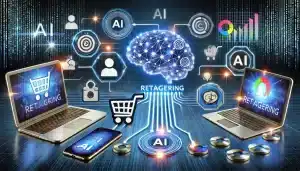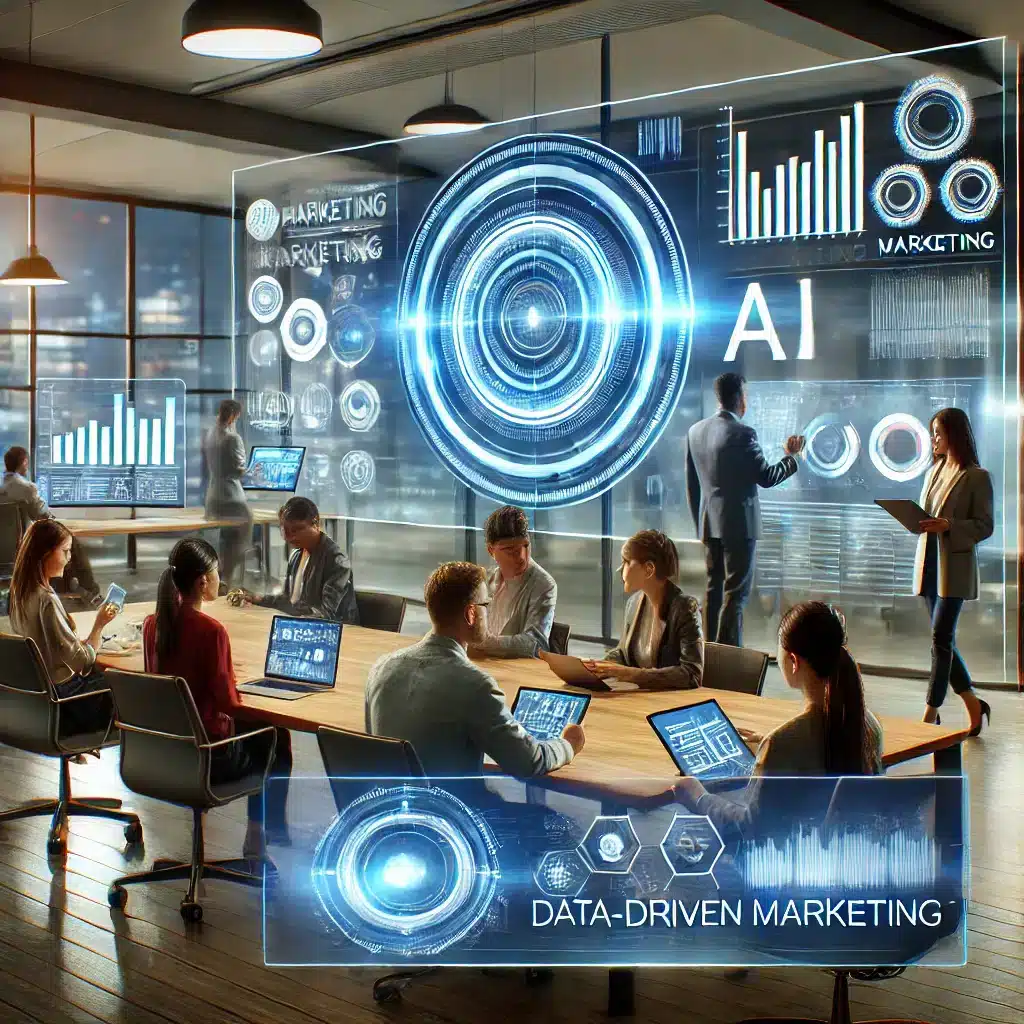In the fast-evolving digital marketing landscape, retargeting has emerged as one of the most effective strategies for re-engaging users who have previously interacted with a brand. However, the traditional approach to retargeting often lacks precision, leading to wasted resources and missed opportunities. Enter Artificial Intelligence (AI). By leveraging AI, businesses can refine their retargeting campaigns, making them more personalized, efficient, and impactful.
Retargeting is a powerful strategy that re-engages users who have previously interacted with a brand. With AI, these campaigns become more precise and effective, enhancing user experience and driving conversions. This article delves into how AI is revolutionizing retargeting campaigns, offering practical insights into its application for superior results.
What is AI-Powered Retargeting?
AI-powered retargeting leverages advanced algorithms and machine learning to identify, analyze, and re-engage users with tailored ads based on their online behavior. Unlike conventional retargeting methods, which rely on static rules, AI introduces dynamic optimization that adapts to user preferences, actions, and intents in real time.
For instance, if a user abandons a shopping cart, AI can analyze the reason—such as price concerns or product comparisons—and serve ads that address these factors, like offering a discount or showcasing alternative products. This level of precision not only enhances user experience but also significantly improves conversion rates.
AI-Powered Personalization:
Behavior Analysis for Deeper Insights
AI excels at analyzing user behavior, from browsing habits to purchase history. By collecting and processing vast amounts of data, AI identifies patterns and preferences, enabling businesses to segment audiences effectively.
For example:
- Users who frequently browse electronics might see ads for the latest gadgets.
- Shoppers who abandon carts are retargeted with special discounts or free shipping offers.
Tailored Messaging That Resonates
AI ensures that the content served is highly relevant to the individual. By crafting dynamic ads with personalized product recommendations, businesses can appeal directly to user interests. This deep level of personalization fosters stronger connections and increases the likelihood of conversions.
Real-Time Optimization with AI
Dynamic Bidding Strategies
AI-driven tools optimize ad bids in real-time, ensuring that businesses spend their budget where it matters most. By analyzing factors like user intent, browsing history, and likelihood to convert, AI adjusts bids to target high-value leads.

Smart Ad Placements
The success of retargeting depends on serving ads at the right place and time. AI identifies the platforms and timeframes where users are most likely to engage, ensuring maximum visibility and relevance.
For example:
- Showing ads on Instagram for fashion-savvy users during their peak browsing hours.
- Targeting professionals on LinkedIn with B2B retargeting campaigns during business hours.
Continuous Campaign Adjustments
Unlike static retargeting strategies, AI continuously monitors campaign performance. It tests different creatives, headlines, and CTAs (calls-to-action), optimizing based on real-time data. This iterative process ensures sustained efficiency and ROI.
Predictive Analytics and AI for Retargeting
AI’s predictive analytics allow marketers to identify high-potential leads and craft messaging that aligns with user intent. This foresight helps in prioritizing efforts and budget allocation, focusing on users most likely to convert.
Identifying High-Potential Leads
AI uses predictive analytics to forecast user behavior. By identifying which users are most likely to convert, businesses can prioritize their retargeting efforts. This ensures that resources are focused on leads with the highest ROI potential.
For example:
- AI can flag users who viewed a product multiple times as high-intent buyers.
- It may deprioritize users who bounce quickly or show no significant interest in the product.
Crafting Intent-Aligned Messaging
AI tailors ads to align with user intent, delivering messages that resonate at every stage of the buying journey. Whether it’s educating top-of-funnel prospects or providing offers to bottom-of-funnel users, AI ensures that the messaging is relevant and impactful.
Enhancing User Experience with AI
AI-driven retargeting campaigns prioritize user experience by eliminating intrusive and irrelevant ads. Instead of bombarding users with generic content, AI ensures that each interaction adds value.
Reducing Ad Fatigue
AI monitors user engagement and adjusts ad frequency to prevent overexposure. By ensuring the right balance, businesses maintain user interest without causing annoyance.
Hyper-Localized Retargeting
Location-based targeting becomes more refined with AI. For instance, users searching for “best restaurants near me” could be served retargeting ads featuring local dining options with special offers, creating a highly personalized experience.
Applications of AI in Retargeting Campaigns
E-commerce
E-commerce businesses can use AI to re-engage cart abandoners with tailored offers, showcase complementary products, or create urgency with limited-time deals.
Travel and Hospitality
AI helps travel brands retarget users who explore vacation packages but don’t book. Personalized ads might feature price drops or highlight destination attractions to entice bookings.
B2B Marketing
In the B2B space, AI-driven retargeting can nurture leads by delivering whitepapers, case studies, or personalized demo offers based on a user’s browsing history on a company’s website.
Entertainment and Media
Streaming platforms can leverage AI to recommend shows or movies based on user preferences, ensuring continued engagement and subscriptions.
AI-Powered Tools for Retargeting Campaigns
Several AI tools are leading the charge in transforming retargeting campaigns:
- Google Ads AI: Automates bidding and targets users based on predictive behavior analysis.
- Meta Ads Manager: AI-driven insights for optimized ad placements across Facebook and Instagram.
- AdRoll: A dedicated retargeting platform using AI for audience segmentation and ad personalization.
- HubSpot: AI-powered tools for personalized email retargeting and CRM integration.
Challenges in AI-Driven Retargeting
While AI offers numerous advantages, businesses must navigate certain challenges:
Data Privacy Concerns
AI relies heavily on user data, making compliance with data protection regulations like GDPR and CCPA crucial. Transparency and user consent are key to ethical AI usage.
Algorithm Bias
AI models are only as good as the data they are trained on. Biased data can lead to skewed targeting, underscoring the need for regular audits and diverse datasets.
Implementation Costs
Integrating AI into retargeting campaigns can require significant upfront investment in tools and training. However, the long-term benefits often outweigh the initial costs.
Best Practices for Leveraging AI in Retargeting Campaigns
- Understand Your Audience: Use AI to segment users based on detailed behavioral analysis.
- Invest in High-Quality Tools: Choose AI platforms that align with your marketing goals and budget.
- Monitor Campaigns Regularly: Continuously analyze performance metrics to optimize strategies.
- Prioritize Privacy: Ensure transparency and compliance with data protection laws.
- Test and Learn: Use A/B testing to refine ad creatives and targeting strategies.
The Future of AI in Retargeting
The role of AI in retargeting is poised to grow even further, with advancements like:
- Voice Search Integration: Targeting users based on voice queries and conversational patterns.
- AI-Generated Content: Creating personalized ad creatives at scale using generative AI.
- Emotion Recognition: Tailoring ads based on user sentiment analysis for deeper engagement.
Conclusion
Harnessing AI for retargeting campaigns is no longer optional but essential for businesses aiming to thrive in today’s digital marketplace. By enabling deep personalization, real-time optimization, and predictive analytics, AI transforms retargeting into a highly efficient and impactful strategy. While challenges like data privacy and implementation costs exist, the benefits far outweigh the hurdles.
As AI technology evolves, its potential to revolutionize retargeting will only grow, helping brands connect with their audience in increasingly meaningful ways. By adopting AI-driven retargeting strategies today, businesses can stay ahead of the curve, boost conversions, and achieve sustained growth in the competitive digital landscape.
FAQs
1. What is retargeting, and why is it important in digital marketing?
Retargeting is a digital marketing strategy that focuses on re-engaging users who have previously interacted with a brand, such as visiting a website or abandoning a shopping cart. It’s important because it helps businesses reconnect with interested prospects, increasing the likelihood of conversions and maximizing the value of existing traffic.
2. How does AI improve retargeting campaigns?
AI enhances retargeting by:
- Personalization: Delivering tailored ads based on user behavior and preferences.
- Real-Time Optimization: Continuously monitoring performance and adjusting bids, placements, and content.
- Predictive Analytics: Forecasting user behavior to prioritize high-potential leads.
- Multi-Channel Engagement: Ensuring effective communication across platforms like email, social media, and display ads.
3. What role does predictive analytics play in retargeting?
Predictive analytics uses AI to analyze historical and real-time data, identifying users most likely to convert. It helps marketers craft personalized messages, allocate budgets efficiently, and focus efforts on high-intent leads, resulting in improved ROI and conversion rates.
4. Can AI help with lead nurturing in retargeting campaigns?
Yes, AI can automate lead nurturing by delivering relevant content at the right time. It ensures consistent engagement with prospects through personalized email sequences, remarketing ads, or targeted offers, keeping them warm throughout the buying journey and increasing the likelihood of conversion.
5. How does AI ensure ad relevance in retargeting campaigns?
AI uses machine learning algorithms to analyze user behavior, preferences, and engagement patterns. This allows businesses to create dynamic ads that align with individual needs and interests, ensuring relevance and minimizing the risk of ad fatigue.



